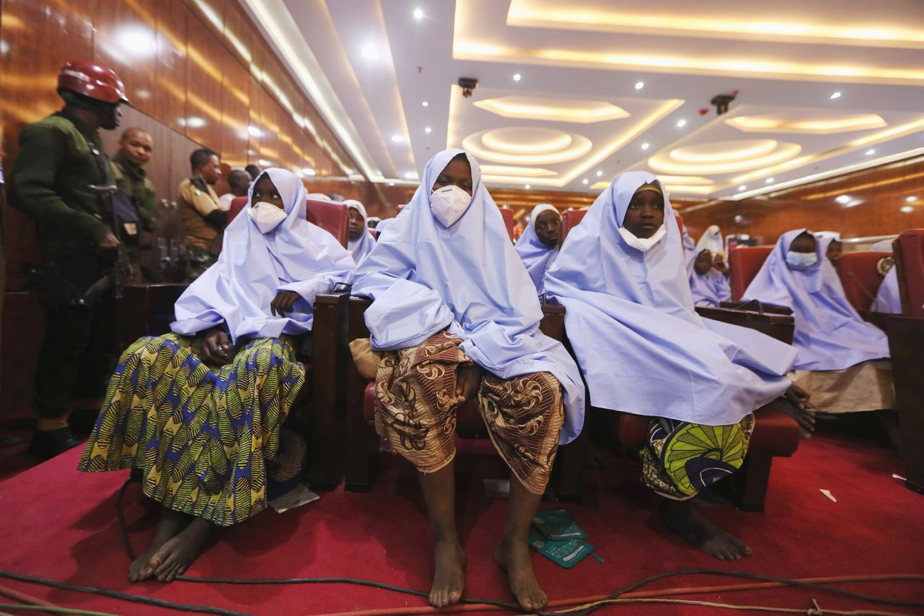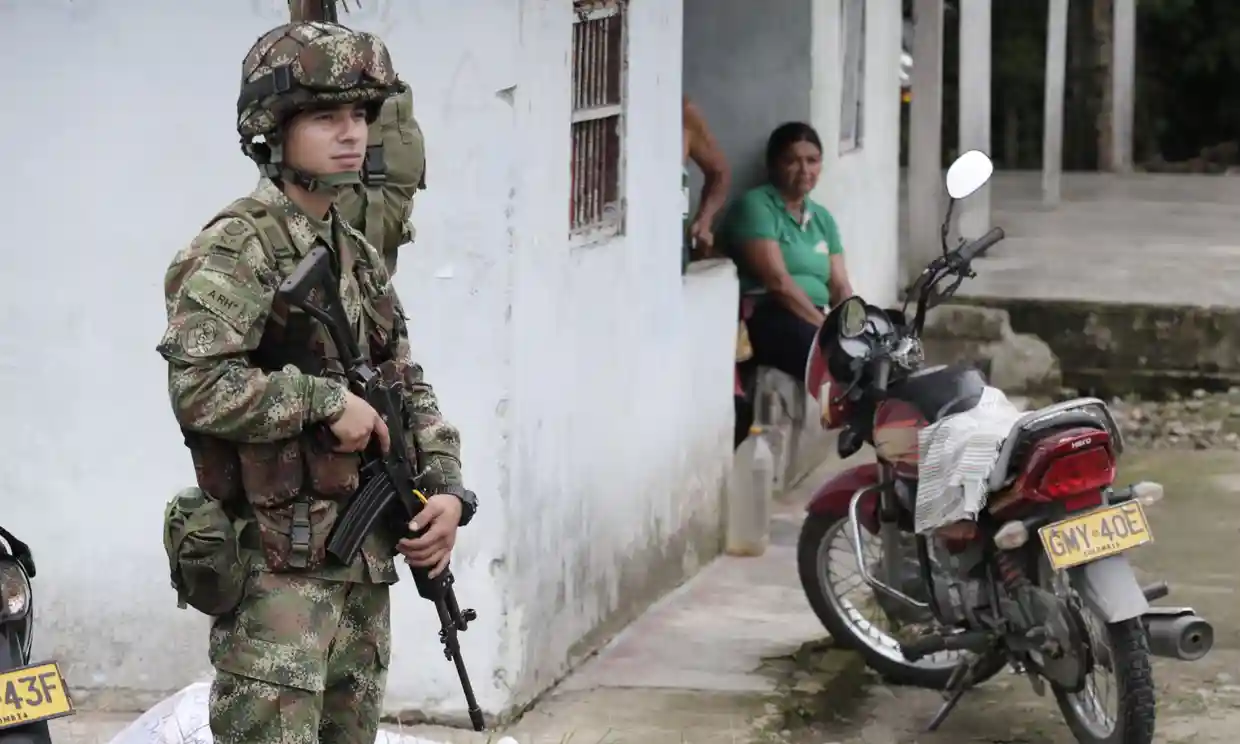Release marks the end of the third mass abduction in northwest Nigeria in recent months
JANGEBE, Nigeria—Gunmen released hundreds of girls who were kidnapped from a boarding school in Nigeria, bringing to an end four days of captivity that underlined the perilous security situation in the northwest of the country.
Dozens of armed men abducted girls between the ages of 11 and 17 from the Government Girls Secondary School in the town of Jangebe at around 1 a.m. Friday and marched them into a nearby forest. The abduction was the second in just over a week in Nigeria’s northwest, where a surge in armed militancy has led to a breakdown of security. Kidnapping for ransom has become a lucrative industry.
“Our daughters are now safe,” Zamfara state Gov. Bello Matawalle wrote on Twitter in posts accompanied by pictures of girls arriving at the state house wearing matching yellow headscarves. “This follows the scaling of several hurdles laid against our efforts.”
On the day of the abduction, authorities said 317 girls had been taken, but the Zamfara information commissioner on Tuesday said the number was actually 279, without giving a reason for the discrepancy.
G athered in rows inside the wood-paneled ceremonial hall state house, the girls sat on gold-padded chairs while the governor hailed their rescue. Some stared ahead silently while others chatted, giddy with the excitement of being free.
Three sisters from the Abdullahi family who were taken together asked worriedly about the fate of their sister, Amina. “We did not see her in the forest,” said the eldest, Nasira. When the sisters discovered that Amina had escaped by hiding in the bathroom, they embraced.
One of the girls, 15-year-old Hafsat Hamisu, said that a ransom was paid to the kidnappers. “In the night, the kidnappers began firing shots to celebrate the arrival of a payment,” she said. “Then we started sleeping and they woke us up, saying, “You idiots, wake up the money has come.”
Government officials said no ransom was paid. “These children were recovered through dialogue,” said Abutu Yaro, the Zamfara police commissioner. “The events and processes of the abduction are still the subject of a police inquiry.”
Later on Tuesday, the government banned mining and imposed a no-flight zone across Zamfara state, ordering a “massive” deployment of military and intelligence assets to restore normalcy to Nigeria’s northwest.
But security analysts said that despite the official denials, kidnapping for ransom was becoming one of the fastest-growing industries in Nigeria, a U.S. counterterrorism ally that is already dealing with a 10-year jihadist rebellion as well as swelling banditry and lawlessness.
“We know ransoms were paid in previous abductions because the perpetrators have admitted it,” said Bulama Bukarti, a terrorism analyst and columnist with the Daily Trust, northern Nigeria’s most popular newspaper. “The kidnappers are treated with kid gloves, which is incentivizing others to get into this industry.”
The release of the girls marks the end of the third high-school abduction in northwest Nigeria in two months. A total of 344 boys were taken from a school in nearby Katsina in December and then freed after a week, and last month 42 people were taken from a school in Niger state.
None of the perpetrators of the recent school kidnappings have been arrested.
Government officials denied paying a ransom for the boys abducted in Katsina and said the kidnappers released them because the military had surrounded them. Three of the boys told The Wall Street Journal that the kidnappers had told them a ransom had been paid for their release.
NIGERIAN ABDUCTIONS
In Nigeria’s Largest-Ever Kidnapping of Schoolgirls, Gunfire, Screams and a Familiar Anguish (March 1)
Nigerian Schoolboys Freed as Search for Abducted Girls Continues (Feb. 27)
Kidnapped Nigerian Schoolboys Say Ransom Was Paid, Tell of Beatings (Dec. 23)
Governors in northern Nigeria have offered amnesty to “repentant bandits,” who have been contracted as mediators to resolve new abductions, a policy that has been widely criticized by Nigeria’s opposition.
President Muhammadu Buhari issued a statement Tuesday celebrating the girls’ liberation but also saying his government was working hard to bring an end to the cycle of abductions.
“The military and the police will continue to go after the kidnappers,” he said. “They need the support of local communities in terms of human intelligence that can help nip criminal plans in the bud.”
But he raised eyebrows on Friday when he appeared to contradict governors’ statements that they don’t pay ransoms, urging them to “review their policy of rewarding bandits with money and vehicles.”
“Such a policy has the potential to backfire with disastrous consequences,” the statement said.
The surge in kidnapping for ransom has signaled the increasing integration of criminality and terrorism in the region. Boko Haram, the jihadist group that kidnapped 276 schoolgirls in 2014, igniting the global #BringBackOurGirls campaign, released a video claiming credit for the Katsina kidnapping, which officials later said was an attempt to influence negotiations.
Criminal groups conducting kidnappings have benefited from the weapons being taken south from war-torn Libya through Niger and across Nigeria’s border. One of the bandits who claimed to be responsible for the Katsina abduction and turned himself in to the government in exchange for amnesty said that buying guns in the country’s north was now like “buying bread.”
In a recent report on kidnapping across Nigeria, SB Morgen, a Lagos-based geopolitical research firm, found that between January 2016 and March 2020 almost $11 million was paid to kidnappers. “It has become a national emergency,” the report said.
The impact on education across the country’s northern states is raising fears of a lost generation that could be recruited by criminal and terrorist groups, feeding the cycle of insecurity. The governor of Yobe state said this week that he would close schools for fear of kidnappings, marking the fourth Nigerian state to lock down education across an expanse home to some 20 million people.
After Tuesday’s press conference, the Jangebe girls were waiting to be reunited with their parents after hours of meetings with officials for medical checkups and security debriefings. Reached on the phone, parents said they were traveling toward the state capital to see their daughters.
Habib Abdullahi, whose three girls were kidnapped, said: “I am elated. We thank God. We thank God.”
Corrections & Amplifications Zamfara’s state governor is Bello Matawalle. An earlier version of this article incorrectly spelled his last name as Mattawelle. (Corrected on March 2)
Write to Joe Parkinson at joe.parkinson@wsj.com




